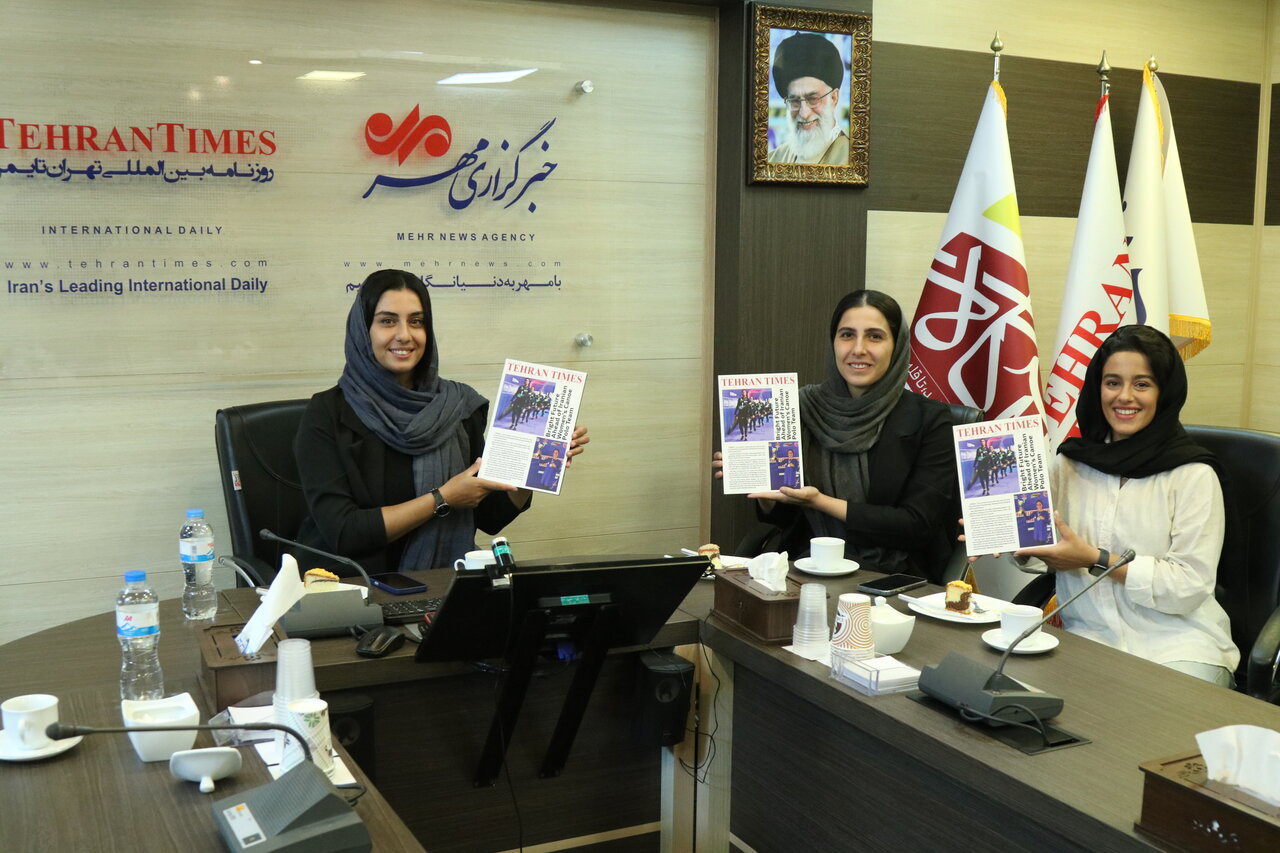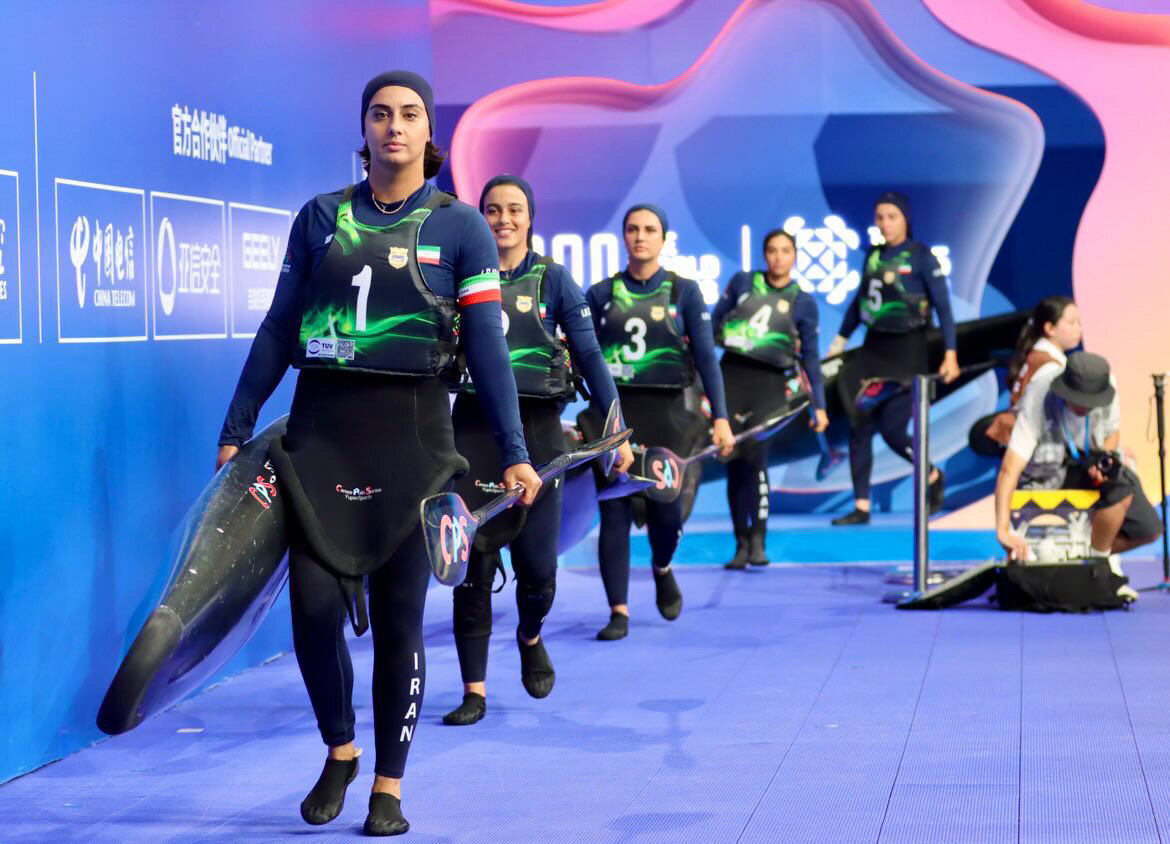We have a lot to say in future, women canoe polo players

TEHRAN – In an exclusive with Tehran Times, Iran’s women’s Canoe Polo players Elaheh Pourabdian, Mahdieh Shabani, and Anahita Mahtarpour talked about their rollercoaster journey in championship.
About 30 years after canoe polo was introduced to Iran’s sports landscape, Iranian women have stolen the show. After winning several medals in Asia, Team Melli made history in the 2024 ICF World Canoe Polo Championship by finishing fourth.
Iran, captained by Pourabdian, faces a long road ahead as powerhouses Germany and New Zealand continue to dominate the sport.
Despite their disappointing performance at the 2025 World Games in Chengdu, Iran’s women’s canoe polo team are determined to shine again in the World Canoe Polo Championship.
In an exclusive interview with Tehran Times, Pourabdian (34-years-old), Shabani (27), and Mahtarpour (24) share their concerns about the team’s future.
Tehran Times: First, please explain more about canoe polo as a non-Olympic sport. As you know, Iranians love football and wrestling and have recently shown interest in volleyball and basketball, but canoe polo remains relatively unknown.
Pourabdian: You’re right. Canoe polo was introduced to Iran in 1986 after Japan gifted us a canoe polo kayak. Since then, both the women’s and men’s teams have played with excitement, though the women’s team have been more successful. However, many Iranians still lack knowledge about canoe polo. Another obstacle is the equipment, which is expensive and leads some athletes to pursue other sports.
Shabani: We have one more problem. The National Team players train at Tehran’s Azadi Lake, while the sport can also be played in swimming pools. Azadi Lake is on the outskirts of Tehran and training involves long commutes, which can be tiring. Training in a city pool would be more convenient, but players are often required to travel to Azadi to participate in training, which can be tedious.
Mahtarpour: Canoe polo has a lot of potential for the future. We need more support to show how capable we are. When we compete, many people ask us, “Are you allowed to play in your country?” It’s surprising for them to see Iranian women competing in a sport like this. One person even asked me if we wear hijab at home (smiles).
Do women’s canoe polo teams have a strong talent pipeline right now, and can we be optimistic about the future?
Mahtarpour: Right now, three provinces—Tehran, Alborz, and Mazandaran—are doing a good job of nurturing talent. Other provinces are also working, but they haven’t yet produced a team that can compete nationally at a high level.
Germany and New Zealand are the powerhouses in the sport. What factors contribute to their success?
Shabani: The first reason is their long history in the sport. We started canoe polo about 30 years ago, but the sport originated in 1970. That history gives them a significant advantage. Another factor is infrastructure; European countries have more training pitches due to geographic circumstances.
Mahtarpour: Another key factor is their leagues. Our domestic league comprises seven teams, and a handful typically dominates. In Europe, a top-tier league attracts players from many countries, creating a strong, well-paid competition. The best national-team players from across Europe join this league, elevating its quality.
Pourabdian: As a player who has competed in the league for about two decades, I believe Iran needs a more competitive league if we want to win medals at world championships. Our league lasts only two weeks and doesn’t build peak fitness. We also need more friendly matches with other teams. Our domestic league, despite seven teams, ends quickly. In the past, seasons were longer and players stayed at peak fitness.
If you were the federation head, what would be your solution to this problem?
Pourabdian: The number of teams isn’t the problem, as long as they compete at a high level and aren’t routinely beaten by 20 goals by the top teams. All teams should be competitive and push each other. Right now, our league is completely predictable in terms of who finishes first, second, and third, which isn’t good.
Shabani: Canoe polo needs a minimum of two overseas competitions per year. Without participating in various events, we can’t test ourselves against big rivals. Other teams participate in diverse competitions and improve, while we rely mainly on training camps.
Mahtarpour: Progress comes from playing and gaining experience against different teams. In addition to a domestic league and various tournaments, we also need international competitions.
How is the situation in other kayaking sports compared to canoe polo, for example rowing?
.Pourabdian: Rowing is in a better situation because its federation is separate. Other disciplines are doing well, but canoe polo doesn’t have Olympic status, which makes its situation more complex
Iran failed to meet expectations at the 2025 World Games in China. What happened?
Pourabdian: First, we are honored to participate in the World Games for the first time. We planned to compete in at least one preparatory tournament before the Games, but the country’s circumstances and a 12-day conflict with Israel prevented us from doing so. Ten months earlier, we reached the third-place match at the 2024 World Championship and finished fourth. Our motivation was high, but our preparatory work was insufficient for the Games.
Mahtarpour: We did fail to meet expectations in China, but the reality is that we have a long road ahead and need time. Canoe polo is a young sport in our country, and we will excel in the future. Competing against the world’s best requires more experience and more warm-up matches.
Shabani: We didn’t perform like in the 2024 ICF World Championships, but in the next edition, which will be held next year in Duisburg, we’ll be a more experienced team and will have a good opportunity to show that “We Are Here.” I remember the 2024 World Championships, when we were playing the Netherlands in the third-place match, and all the women’s teams in the stands cheered us.
Sponsorship is reportedly lacking for canoe polo. Is this a concern?
Pourabdian: The federation and the Ministry of Sport are doing their best, but we need more support, especially from sponsors who can help. We are ready to be dispatched to the Asian Championships in Malaysia and hope to participate in these competitions without any problems.

What is your overall assessment of the level of Iranian women’s canoe polo, and has there been progress in recent years?
Shabani: Overall, the athletes have made good progress. It isn’t just about me or my teammates; all of us have improved. I haven’t been in the sport for many years, but we are still not getting the recognition we deserve for our effort. The nature of this sport is that we must participate in international tournaments.
Mahtarpour: Apart from the World Games, younger players haven’t yet had the chance to attend the Asian Championships, but our captain, Pourabdian, has won nine Asian medals and competed in various international events. Athletes who have dedicated so many years deserve more attention. The recent World Games did bring visibility to women’s canoe polo and garnered strong support in many aspects.
Do you think about coaching?
Pourabdian: I’m a national-team player, but I coach the Tehran team in domestic competitions. Honestly, I’m not very interested in coaching the national team; it’s stressful, and the role is very demanding. The stress a coach feels off the water is different from what athletes experience in competition.
Tell us about the World Games in Chengdu. How did each match go?
Shabani: The first match against China was easy, and we won decisively. China was the host and participated without qualifiers, which is why their level was lower.
Mahtarpour: The next match was against New Zealand. We had previously lost to New Zealand 7-2 at the World Championships, so we had experience against them. This time we played much better and could have won, but we lost 3-2.
Pourabdian: The third match was against Germany, a team we hadn’t faced in a long time. The last time Iran played Germany was at the 2014 World Championships in France, and I’m the only remaining player with experience against them. Germany’s generation has changed, and we didn’t get a good result against them. We also had no prior experience against Italy and lost. If we had more experience against those two teams, we might have performed better. We had analyzed our opponents well, but analysis alone isn’t enough; playing international matches is what truly prepares the team.
Which teams are Iran’s serious rivals in the Asian Championships?
Pourabdian: Singapore and Chinese Taipei are the favorites in Asia. After missing a World Games spot, they started rebuilding their teams and participated in three or four European tournaments. This shows they’re determined to win the Asian Championships.
Mahtarpour: Iran is definitely among the top contenders for a medal, but we can’t predict the color. The Iranian women’s team have often reached the final or at least won bronze.
Do Iran need a foreign coach, and how is the level of coaching in Iran?
Mahtarpour: A foreign coach would certainly help Iranian canoe polo progress. Coaches from top teams with a track record of international titles would be valuable.
Shabani: Iranian coaches are at a good level, but a knowledgeable coach from abroad could elevate the sport further.
Pourabdian: Iran’s level is strong, especially among women, but with access to modern knowledge and top coaches, we could be among the world’s top three teams.
Leave a Comment